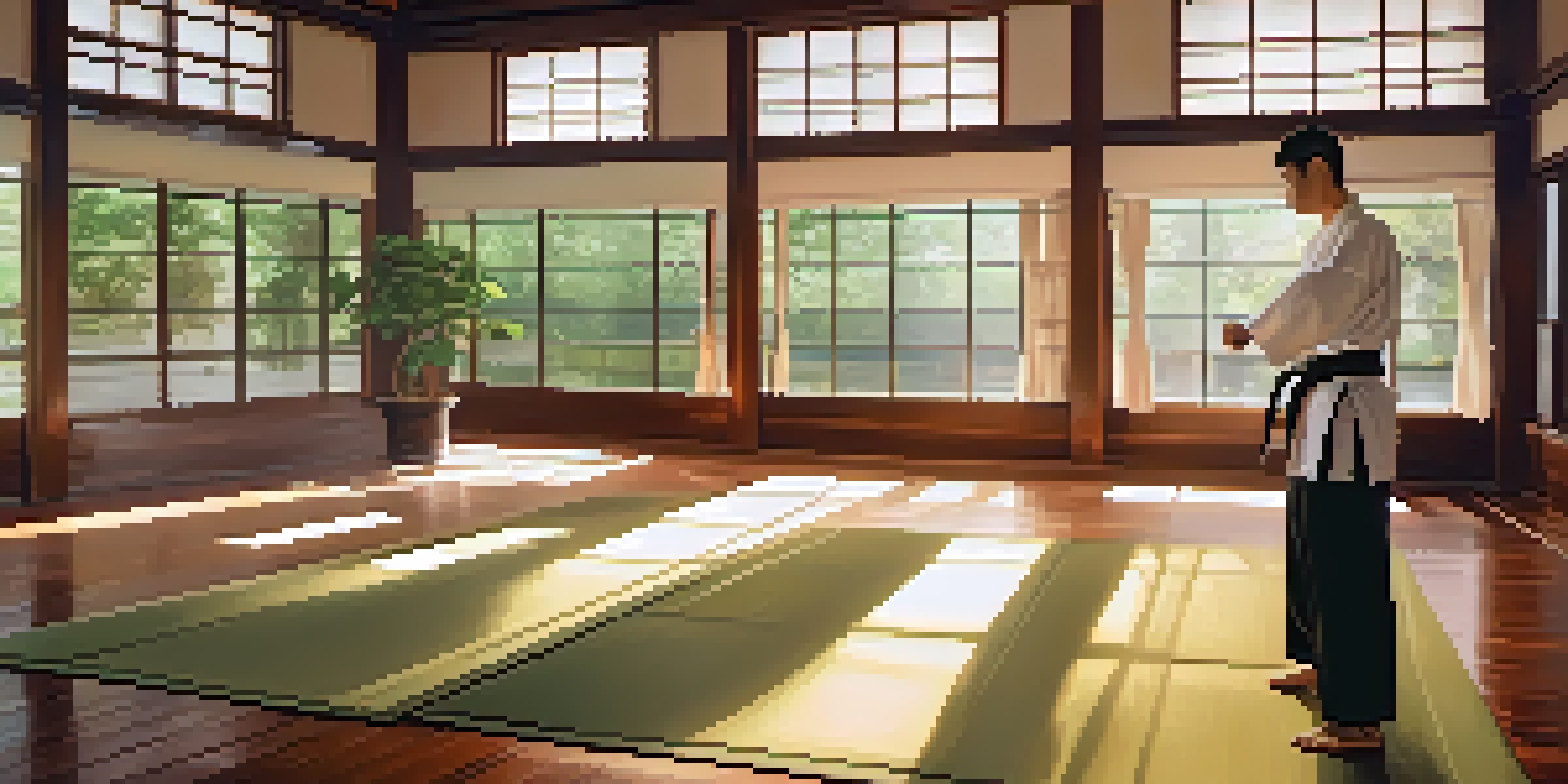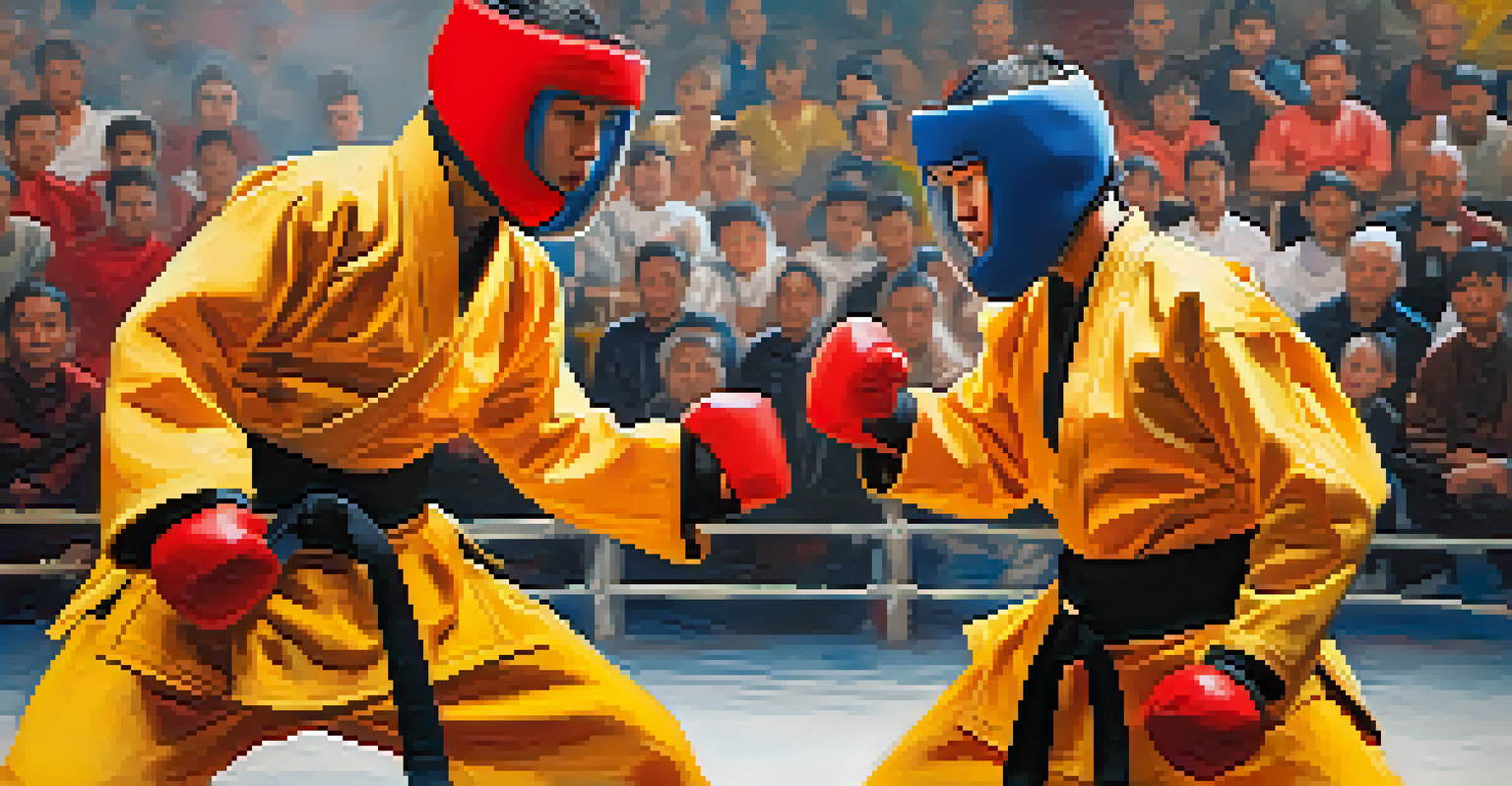The Science Behind Mind-Body Connection in Martial Arts

Understanding the Mind-Body Connection
The mind-body connection refers to the intricate relationship between our thoughts, emotions, and physical state. In martial arts, this concept is not just philosophical; it’s grounded in science. It suggests that mental processes can influence physical performance and vice versa, creating a powerful synergy.
The mind is everything. What you think you become.
When martial artists train, they often engage in mindfulness practices that enhance their focus and awareness. This heightened state of consciousness allows them to perform techniques more effectively and react more swiftly. Research shows that this mental engagement can lead to improved muscle coordination and overall athletic performance.
Understanding this connection is vital for martial artists, as it can lead to greater emotional resilience and mental clarity. By fostering a strong mind-body connection, practitioners can enhance their training and achieve their goals more efficiently.
The Role of Neuroplasticity
Neuroplasticity is the brain's ability to reorganize itself by forming new neural connections throughout life. In martial arts, this means that consistent practice can physically change the brain, improving coordination and reaction times. When practitioners repeat movements, they strengthen the neural pathways associated with those actions.

For example, when a martial artist practices a kick repeatedly, their brain begins to optimize the motor patterns involved. This not only makes the kick more effective but also allows for quicker responses in real-time situations. As a result, the mind learns to anticipate movements, enhancing overall performance.
Mind-Body Connection in Training
Martial artists can enhance their performance by fostering a strong mind-body connection, leading to better focus and emotional resilience.
Embracing neuroplasticity in training can lead to lasting changes, making martial artists not just physically adept but mentally sharp as well. This adaptability is crucial for overcoming challenges both on and off the mat.
Impact of Stress on Performance
Stress is a natural part of life, but its impact on performance can be significant, especially in martial arts. Understanding how stress affects the mind and body can help practitioners manage it effectively. High levels of stress can lead to decreased focus, impaired judgment, and hindered physical performance.
It's not the load that breaks you down, it's the way you carry it.
Martial arts training often incorporates stress management techniques, such as deep breathing and visualization. These practices help calm the mind, allowing practitioners to regain focus and center themselves during intense situations. By learning to control their stress response, martial artists can perform better under pressure.
Ultimately, managing stress is about finding balance. By developing coping strategies through training, martial artists can enhance their resilience and maintain peak performance, even in the face of adversity.
Mindfulness and Its Benefits in Martial Arts
Mindfulness involves being fully present and engaged in the moment, which can significantly enhance martial arts training. Practicing mindfulness helps martial artists become more aware of their thoughts, feelings, and physical sensations. This heightened awareness can lead to improved focus and decision-making during practice and competition.
For instance, when a martial artist is mindful, they can better perceive their opponent’s movements and intentions. This allows for quicker reactions and more effective counters. Moreover, mindfulness can reduce anxiety and improve confidence, enabling practitioners to perform at their best.
Neuroplasticity Enhances Skills
Consistent practice in martial arts physically changes the brain, improving coordination and reaction times through neuroplasticity.
Incorporating mindfulness into training not only boosts physical performance but also fosters a deeper connection to the practice. This holistic approach can lead to more fulfilling training experiences and personal growth.
The Role of Visualization Techniques
Visualization is a powerful technique used by athletes to enhance performance by mentally rehearsing movements and techniques. In martial arts, visualization helps practitioners prepare for competitions and improve their skills. By imagining themselves executing techniques perfectly, they can strengthen their neural pathways and increase confidence.
Research shows that mental rehearsal can activate the same brain regions as physical practice. This means that when martial artists visualize their movements, they’re effectively training the mind, which can translate into better execution during actual practice. It’s like a mental warm-up that primes the body for performance.
Integrating visualization into training routines can be a game changer. It allows practitioners to refine their techniques, build confidence, and enhance their overall martial arts journey.
Emotional Regulation in Martial Arts
Emotional regulation is the ability to manage and respond to emotional experiences in a healthy way. In martial arts, this skill is essential for maintaining focus and composure during training and competitions. By mastering emotional regulation, martial artists can harness their emotions rather than allowing them to control their actions.
For example, a martial artist who feels anxious before a competition can use techniques learned during training to calm themselves. This might involve deep breathing, positive self-talk, or recalling successful past performances. Such strategies can make a significant difference in performance outcomes.
Stress Management Strategies
Effective stress management techniques, like deep breathing and visualization, help martial artists maintain focus and peak performance under pressure.
Ultimately, emotional regulation enhances the mind-body connection, leading to improved focus and execution. By cultivating this skill, martial artists can thrive in both their practice and personal lives.
Building Resilience Through Martial Arts
Resilience is the ability to bounce back from challenges and setbacks, a vital trait for martial artists. The journey of mastering martial arts is filled with ups and downs, and developing resilience can make all the difference. Through rigorous training and overcoming obstacles, practitioners learn to adapt and persevere.
In martial arts, facing challenges head-on—whether it’s sparring, learning a new technique, or preparing for a competition—builds mental toughness. This process teaches martial artists to embrace discomfort and view setbacks as opportunities for growth. Each challenge faced on the mat prepares them for life's challenges off the mat.

By fostering resilience, martial artists can navigate the complexities of their training and personal lives with greater ease. This strength not only enhances their practice but also contributes to their overall well-being.